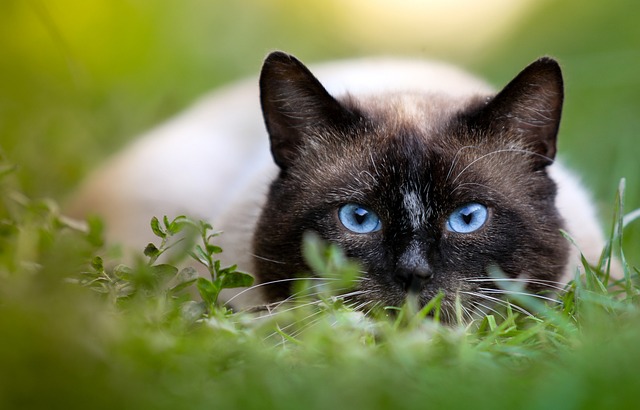History and Origins of the Siamese Cat Breed

The Siamese cat is an ancient and distinguished breed with origins rooted in the Kingdom of Siam (modern-day Thailand). These cats have a rich history and were highly revered by royalty and nobility. Here’s a glimpse into the captivating history of the Siamese cat breed:
- Ancient Roots: Siamese cats are believed to have originated in Siam (now Thailand) as early as the 14th century. They were cherished companions of royalty, monks, and nobility.
- Royal Guardians: Siamese cats were considered sacred and were entrusted with guarding temples and palaces in Siam. They were believed to bring good fortune and protection to their owners.
- Export to the West: Siamese cats first gained international attention in the late 19th century when they were brought to England as gifts for British diplomats. They quickly captured the hearts of Western cat enthusiasts.
- Breed Development: The modern Siamese breed was refined in Europe and North America through selective breeding. Breeders focused on preserving the breed’s striking appearance and distinctive color points.
- Recognition: The Siamese breed was officially recognized by cat registries in the late 19th century. It quickly became one of the most popular and recognizable cat breeds worldwide.
- Continued Popularity: Siamese cats remain beloved companions and show cats known for their elegance, intelligence, and vocal nature. They are consistently ranked among the most popular cat breeds globally.
Physical Characteristics and Appearance of Siamese Cats
Siamese cats are renowned for their striking appearance, sleek bodies, and captivating blue eyes. They possess distinct physical characteristics that set them apart from other cat breeds. Here are the key features of Siamese cats:
- Body Type: Siamese cats have a slender, elegant body with a long, muscular build. They are medium-sized cats with a graceful and athletic appearance.
- Coat: The Siamese coat is short, fine-textured, and lies close to the body. The coat is glossy and requires minimal grooming. Siamese cats have a colorpoint pattern, meaning their coat is lighter on the body and darker on the ears, face, paws, and tail.
- Color Points: Siamese cats are known for their striking color points, which contrast dramatically against their lighter bodies. Common color points include seal (dark brown), blue (pale gray), chocolate, and lilac (pale pinkish-gray).
- Face: Siamese cats have a triangular-shaped head with a straight profile. They have large, almond-shaped blue eyes that are deep-set and expressive. Their ears are large, pointed, and tilted slightly forward.
- Tail: Siamese cats have a long, slender tail that tapers to a point. The tail is in proportion to the body and complements their overall sleek appearance.
- Eyes: One of the most distinctive features of Siamese cats is their vivid blue eyes. The intensity of the blue eye color is a hallmark of the breed and adds to their striking appearance.
- Voice: Siamese cats are known for their vocal nature and unique vocalizations. They are often described as “talkative” and enjoy communicating with their owners.
- Personality: Beyond their physical beauty, Siamese cats are intelligent, social, and affectionate companions. They thrive on human interaction and enjoy being involved in household activities.
- Behavior: Siamese cats are active, playful, and curious by nature. They enjoy interactive toys, climbing, and exploring their surroundings. They form strong bonds with their owners and are known for their loyalty.
Siamese cats are a delightful combination of elegance and personality. Their distinctive appearance, vibrant blue eyes, and engaging demeanor make them cherished companions and beloved members of many households. Whether as show cats or devoted pets, Siamese cats continue to captivate cat lovers around the world with their charm and grace.
Siamese Cat Temperament and Personality Traits
Siamese cats are renowned for their distinctive temperament and engaging personality. They are intelligent, social, and vocal cats that form strong bonds with their owners. Understanding their unique traits can help you provide the best care and companionship for your Siamese cat. Here are the key temperament and personality traits of Siamese cats:
- Intelligence: Siamese cats are exceptionally smart and quick-witted. They enjoy interactive toys, puzzle games, and learning new tricks. Siamese cats can be trained to respond to commands and enjoy mental stimulation.
- Social Nature: Siamese cats are highly social and thrive on companionship. They form strong attachments to their owners and enjoy being involved in household activities. Siamese cats are known to follow their owners around and seek attention.
- Vocalization: Siamese cats are famously talkative and expressive. They are not afraid to voice their opinions and communicate with their owners through a range of vocalizations, from soft chirps to loud meows.
- Affectionate: Siamese cats are affectionate companions that enjoy cuddling and being close to their owners. They often seek physical contact and may even sleep beside or on top of their favorite humans.
- Curiosity: Siamese cats are curious by nature and love exploring their surroundings. They are active cats that enjoy climbing, jumping, and investigating new spaces. Providing them with interactive toys and vertical space is essential for their well-being.
- Playfulness: Siamese cats retain their playful nature well into adulthood. They enjoy interactive play sessions and thrive on activities that engage their minds and bodies.
- Loyalty: Siamese cats are known for their loyalty and devotion to their families. They often bond closely with one or more family members and may show a preference for certain individuals.
- Attention-Seeking: Siamese cats crave attention and interaction. They may demand to be the center of attention and enjoy being included in daily routines. They thrive in households where they receive ample social interaction.
- Sensitivity: Siamese cats are sensitive to their environment and the emotions of their owners. They can be affected by changes in routine or household dynamics and may become stressed in noisy or chaotic environments.
- Assertiveness: Siamese cats are confident and assertive cats that know what they want. They are not shy about expressing their desires and can be quite persuasive when seeking attention or treats.
- Compatibility with Other Pets: Siamese cats generally get along well with other pets, especially if they are introduced properly and given time to adjust. They may form close bonds with other cats or cat-friendly dogs.
Overall, Siamese cats are loving, sociable companions with a zest for life. Their engaging personality, intelligence, and vocal nature make them cherished members of many households.
Care and Grooming Needs for Siamese Cats
Siamese cats have moderate grooming needs and require regular care to keep them healthy and happy. Here are some important care and grooming tips for Siamese cats:
- Brushing: Siamese cats have short, fine coats that are relatively low-maintenance. Regular brushing with a soft-bristled brush helps remove loose hair and distribute natural oils, keeping the coat shiny and healthy.
- Bathing: Siamese cats generally do not require frequent baths unless they get exceptionally dirty. Use a gentle cat shampoo and lukewarm water when bathing your Siamese cat, and be sure to dry them thoroughly afterward.
- Nail Trimming: Keep your Siamese cat’s nails trimmed to prevent them from becoming too long or sharp. Use cat-specific nail clippers and trim the tips of the nails every few weeks.
- Ear Cleaning: Check your Siamese cat’s ears regularly for dirt, wax buildup, or signs of infection. Clean the outer ear with a cotton ball dampened with a vet-recommended ear cleaner, but avoid inserting anything into the ear canal.
- Dental Care: Dental hygiene is important for Siamese cats to prevent dental issues such as tartar buildup and gum disease. Brush your cat’s teeth regularly with a cat-friendly toothbrush and toothpaste.
- Nutrition: Feed your Siamese cat a balanced diet that meets their nutritional needs. Choose high-quality cat food formulated for their age, activity level, and health status. Fresh water should be available at all times.
- Exercise: Siamese cats are active and playful by nature. Provide them with plenty of opportunities for physical exercise and mental stimulation. Interactive toys, climbing structures, and play sessions will help keep them happy and healthy.
- Veterinary Care: Schedule regular veterinary check-ups for your Siamese cat to monitor their health and address any medical concerns. Keep up with vaccinations, parasite prevention, and routine screenings.
- Environmental Enrichment: Create a stimulating environment for your Siamese cat with scratching posts, cat trees, interactive toys, and perches near windows. Siamese cats enjoy vertical space and opportunities to observe their surroundings.
- Social Interaction: Spend quality time with your Siamese cat every day, engaging in interactive play, grooming sessions, or simply relaxing together. Siamese cats thrive on companionship and enjoy being part of the family.
By providing attentive care, regular grooming, and a stimulating environment, you can ensure that your Siamese cat remains healthy, happy, and contented. Their loving nature and lively personality make them wonderful companions for cat enthusiasts of all ages.
Health Considerations and Common Issues in Siamese Cats
Siamese cats are generally healthy and resilient, but like all breeds, they may be prone to certain health conditions. Understanding these potential issues and providing appropriate veterinary care can help ensure the well-being of your Siamese cat. Here are some common health considerations and issues in Siamese cats:
- Respiratory Issues: Siamese cats are known to be susceptible to respiratory conditions such as asthma and upper respiratory infections (URIs). Their genetic predisposition to these issues may require management with medications or environmental modifications.
- Dental Problems: Siamese cats can be prone to dental issues such as periodontal disease and dental tartar buildup. Regular dental care, including tooth brushing and professional cleanings, is essential to maintain oral health.
- Kidney Disease: Siamese cats may have an increased risk of developing chronic kidney disease (CKD) later in life. Routine veterinary check-ups and blood tests can help detect early signs of kidney dysfunction.
- Heart Disease: Some Siamese cats may inherit genetic predispositions to certain heart conditions, such as hypertrophic cardiomyopathy (HCM). Regular cardiac screenings by a veterinarian are recommended for early detection.
- Amyloidosis: Siamese cats may be predisposed to amyloidosis, a condition where abnormal protein deposits form in organs like the kidneys. Symptoms may include weight loss, increased thirst, and changes in urination patterns.
- Liver Issues: Siamese cats can be susceptible to liver problems, including hepatic lipidosis (fatty liver disease). Proper nutrition and veterinary care are important for preventing and managing liver conditions.
- Hyperthyroidism: Siamese cats may be at increased risk of developing hyperthyroidism, an overactive thyroid gland. Symptoms may include weight loss, increased appetite, and hyperactivity.
- Eye Problems: Siamese cats are prone to certain eye conditions, such as progressive retinal atrophy (PRA) and glaucoma. Regular eye exams by a veterinary ophthalmologist can help monitor eye health.
- Obesity: Due to their hearty appetites and sedentary lifestyles, Siamese cats may be prone to obesity if overfed or under-exercised. Monitor their food intake and provide regular exercise to maintain a healthy weight.
- Urinary Tract Issues: Siamese cats may be prone to urinary tract conditions, such as urinary crystals or blockages. Ensure they have access to fresh water and a balanced diet to support urinary health.
- Allergies: Some Siamese cats may develop allergies to environmental triggers or certain foods. Symptoms may include itching, skin irritation, or digestive issues. Identify and eliminate potential allergens from their environment.
- Joint Problems: Siamese cats, particularly as they age, may experience joint issues such as arthritis. Provide soft bedding and consider joint supplements to support their mobility.
Living with a Siamese Cat: Suitable Environments and Lifestyle Considerations

Siamese cats thrive in environments that cater to their social, active, and intelligent nature. Providing a suitable living environment and lifestyle can help ensure a happy and fulfilling life for your Siamese cat. Here are some considerations for living with a Siamese cat:
- Indoor Living: Siamese cats are best suited to indoor living to protect them from outdoor hazards and reduce exposure to respiratory triggers. Create an enriched indoor environment with climbing structures, scratching posts, and interactive toys.
- Companionship: Siamese cats are social creatures that thrive on human companionship. Spend quality time with your Siamese cat through interactive play, grooming sessions, or simply relaxing together.
- Environmental Enrichment: Keep your Siamese cat mentally stimulated with puzzle toys, rotating toys, and opportunities for exploration. Siamese cats enjoy climbing and perching, so provide vertical spaces and window perches.
- Regular Exercise: Engage your Siamese cat in daily play sessions to fulfill their exercise needs. Interactive toys, feather wands, and puzzle feeders can help keep them active and prevent obesity.
- Nutritious Diet: Feed your Siamese cat a balanced and appropriate diet tailored to their age, activity level, and health status. Provide fresh water at all times and monitor their food intake to prevent overeating.
- Regular Veterinary Care: Schedule routine veterinary check-ups for your Siamese cat to monitor their health, detect potential issues early, and administer vaccinations and parasite prevention treatments.
- Grooming: Siamese cats have short coats that require minimal grooming. Brush them regularly to remove loose hair and prevent matting. Pay special attention to dental care and trim their nails as needed.
- Safe and Stress-Free Environment: Create a safe and stress-free environment for your Siamese cat by minimizing loud noises, providing hiding spots, and offering a consistent routine. Siamese cats are sensitive to changes in their environment.
- Interaction with Other Pets: Siamese cats generally get along well with other pets, especially if they are introduced gradually and given time to acclimate. Supervise interactions and provide separate spaces if needed.
- Attention and Affection: Shower your Siamese cat with love, attention, and affection. Siamese cats thrive on human interaction and enjoy being included in daily activities.
By understanding the unique needs and characteristics of Siamese cats, you can create a nurturing and supportive environment that enhances their well-being and strengthens the bond between you and your feline companion. Siamese cats are wonderful companions known for their intelligence, affection, and lively personality.
Siamese Cat Variations and Breeding Practices
Siamese cats are a breed with specific standards and characteristics defined by cat registries like The International Cat Association (TICA) and the Cat Fanciers’ Association (CFA). While the breed generally adheres to specific standards in terms of appearance and temperament, there can be variations within the Siamese breed based on breeding practices and genetic factors. Here’s an overview of Siamese cat variations and common breeding practices:
Variations in Siamese Cats:
- Traditional vs. Modern Siamese:
- Traditional Siamese (Applehead): These cats have a more rounded head shape and a slightly stockier build compared to the modern Siamese. Traditional Siamese cats may have less extreme features and are sometimes referred to as “appleheads” due to their rounder face shape.
- Modern Siamese: Modern Siamese cats have a more elongated and slender body, with a triangular-shaped head, large ears, and almond-shaped blue eyes. They have a sleek and elegant appearance with prominent color points.
- Color Points:
- Siamese cats are known for their color points, which are darker areas on the ears, face, paws, and tail against a lighter body color. Common color points include seal (dark brown), blue (pale gray), chocolate, and lilac (pale pinkish-gray).
- Variation in intensity and contrast of color points can occur due to breeding practices and genetics.
- Coat Texture and Color:
- Siamese cats have short, fine coats that lie close to the body. The coat is smooth and glossy with minimal shedding.
- Some Siamese cats may exhibit variations in coat texture or color saturation based on genetics and breeding practices.
- Physical Features:
- Siamese cats have a slender and athletic body with a long tail that tapers to a point.
- Variations in body size, proportions, and facial features can occur based on breeding lines and regional preferences.
Breeding Practices for Siamese Cats:
- Health and Temperament:
- Responsible breeders prioritize the health, temperament, and well-being of Siamese cats in their breeding programs.
- They conduct health screenings for genetic conditions and ensure that breeding cats have stable and friendly temperaments.
- Preservation of Breed Standards:
- Breeders adhere to established breed standards defined by cat registries to preserve the Siamese breed’s unique characteristics.
- They selectively breed cats that exhibit desirable traits such as color points, body type, and temperament.
- Genetic Diversity:
- Maintaining genetic diversity is important in Siamese cat breeding to minimize the risk of inherited health issues and preserve the breed’s vitality.
- Responsible breeders may collaborate with other breeders to exchange genetic lines and expand the gene pool.
- Ethical Practices:
- Reputable breeders follow ethical breeding practices and prioritize the welfare of their cats.
- They provide proper care, nutrition, socialization, and veterinary attention for breeding cats and their kittens.
- Breeding Goals:
- The primary goal of Siamese cat breeding is to produce healthy, well-socialized kittens that adhere to breed standards.
- Breeders may specialize in specific color points or variations within the Siamese breed based on personal preferences and breeding objectives.
Overall, Siamese cats are a well-defined breed with distinctive characteristics that are carefully preserved through responsible breeding practices. Variations in appearance and traits within the Siamese breed can occur due to genetic factors and selective breeding aimed at maintaining breed standards and health. When acquiring a Siamese cat, it’s important to choose a reputable breeder who prioritizes the health, temperament, and integrity of the breed.
50 Best Names with Meanings for Siamese Cats
Naming your Siamese cat is a delightful way to celebrate their unique personality and distinctive appearance. Here’s a list of 50 best names with meanings for Siamese cats:
- Miko – Japanese name meaning “beautiful.”
- Kai – Hawaiian name meaning “sea.”
- Luna – Latin name meaning “moon.”
- Suki – Japanese name meaning “beloved.”
- Leo – Latin name meaning “lion.”
- Coco – Spanish name meaning “chocolate.”
- Mochi – Japanese name for a sweet rice cake.
- Zephyr – Greek name meaning “west wind.”
- Ivy – English name referring to the climbing plant.
- Jasper – Gemstone name, denotes “spotted or speckled stone.”
- Mia – Italian name meaning “mine.”
- Finn – Irish name meaning “fair” or “white.”
- Nala – African name meaning “gift.”
- Echo – Greek mythology name for a nymph.
- Milo – German name meaning “beloved.”
- Cleo – Short for Cleopatra, meaning “glory of the father.”
- Sasha – Russian name meaning “defender of mankind.”
- Iris – Greek name referring to the rainbow.
- Kiko – Japanese name meaning “chronicle.”
- Remy – French name meaning “oarsman” or “remedy.”
- Loki – Norse mythology name for a trickster god.
- Zara – Arabic name meaning “princess.”
- Rio – Spanish name meaning “river.”
- Maya – Sanskrit name meaning “illusion” or “magic.”
- Ziggy – German name meaning “victorious protector.”
- Niko – Greek name meaning “victory.”
- Athena – Greek mythology name for the goddess of wisdom.
- Suki – Japanese name meaning “beloved.”
- Rumi – Persian name meaning “beauty” or “flowing.”
- Jinx – English name referring to a charm or spell.
- Loki – Norse mythology name for a trickster god.
- Coco – Spanish name meaning “chocolate.”
- Mika – Japanese name meaning “beautiful fragrance.”
- Saber – Latin name meaning “sword.”
- Misty – English name referring to light fog.
- Astra – Latin name meaning “star.”
- Skye – English name referring to the sky.
- Zen – Japanese name meaning “meditation” or “peace.”
- Pixel – Refers to a small part of an image on a computer screen.
- Athena – Greek mythology name for the goddess of wisdom.
- Pixel – Refers to a small part of an image on a computer screen.
- Sushi – Japanese cuisine name.
- Mocha – Coffee-flavored drink name.
- Sable – Refers to a type of fur or color.
- Cleo – Short for Cleopatra, meaning “glory of the father.”
- Jazz – Refers to a genre of music.
- Gizmo – Refers to a gadget or device.
- Echo – Greek mythology name for a nymph.
- Bamboo – Tall grass name.
- Typhoon – Refers to a strong tropical storm.
Choose a name that resonates with your Siamese cat’s personality, appearance, or your personal preferences. Whether you prefer a name inspired by mythology, nature, or cultural significance, your Siamese cat will appreciate the love and care you provide, regardless of their name!

In conclusion, the Siamese cat is a captivating and elegant breed known for its striking appearance, vocal nature, and affectionate personality. Originating from Thailand (formerly Siam), these cats have become popular worldwide for their sleek body, striking blue eyes, and color-pointed coat. Siamese cats are highly social and enjoy being the center of attention, forming strong bonds with their human companions. They are intelligent, curious, and often communicate with their distinctive voice. Siamese cats thrive in interactive environments where they receive mental stimulation and companionship. With their playful and loving nature, Siamese cats make wonderful additions to families and households that appreciate their active and engaging personalities.


























